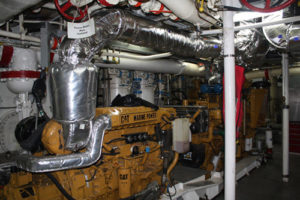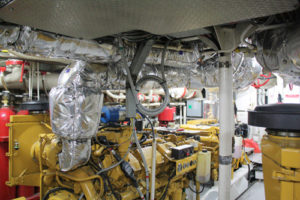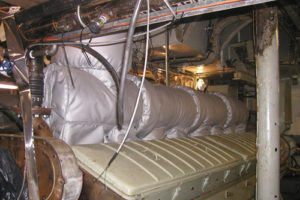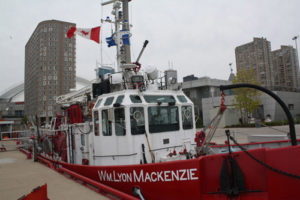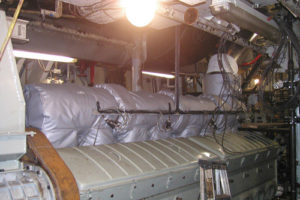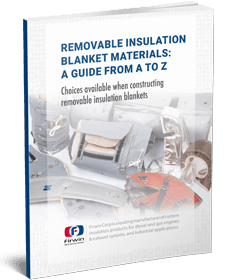
Extreme high temperatures are always hazardous, but this danger increases onboard ships where narrow and confined spaces can collect heat and exacerbate heating and cooling challenges. In the tight quarters found on most ships, the odds of personnel coming into contact with an overheated exhaust component increase dramatically. Additionally, high ambient levels of heat may damage equipment and increase the risk of fires. Ships also have especially small engine rooms which can collect heat generated by the engine and pose a variety of safety hazards ranging from heat exhaustion to burns.
The marine industry is particularly prone to this type of problem because ship engines are used for prime power—they run constantly, generating significant heat. Firwin provides a broad range of insulation solutions that can help engineers safely control, disperse, and/or redirect heat in the close operating quarters found on most marine vessels.
How Insulation Can Help
While high temperatures and heat loads can prove dangerous, marine exhaust insulation can improve the safety and efficacy of a ship’s engine room in a number of ways. Insulating exhaust components protects workers, keeping them from getting burned when working near hot equipment. Insulation also significantly reduces both heat loss and engine room noise.
Insulation can be used to control excess heat and noise from:
- Exhaust components
- Steam piping systems
- Silencers
- Piping
- Engine components
- Turbines
The fibrous nature of many insulation materials has a Noise Reduction Coefficient rating of 0.75 for one inch. If you need additional noise reduction, it is possible to layer insulation using higher density membranes. It is vital to ensure that any composites used always fall within the required fire safety standards.
There are two main categories for insulation solutions: removable and permanent.
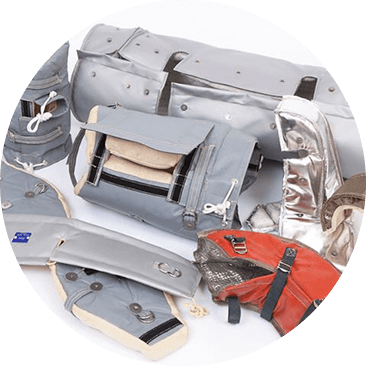
Removable Insulation—Firwin's Removable Insulation Blankets
Perfect for components with frequent maintenance or inspection requirements, removable &reusable insulation blankets are designed to be easily installed and removed as necessary. These blankets are wrapped around engines and exhaust components and fastened with stainless steel lacing wire. They are made in small sections so that the entire blanket doesn’t need to be removed in order to perform maintenance—instead, only an individual section needs to be removed and reinstalled.
Removable insulation blankets have a number of significant advantages. Their ease of use means that personnel do not need to be specially trained to install or remove the insulation. Additionally, no tools are required for installation and removal.
Removable insulation blankets are specially designed to cover even the smallest gaps between components, meaning that they provide full coverage despite being made up of smaller panels. Due to the continuous amounts of high heat often generated in ship engine rooms and other marine applications, a thicker insulation of approximately two inches may be ideal.
Permanent Insulation—Firwin's Hard Coat Insulation
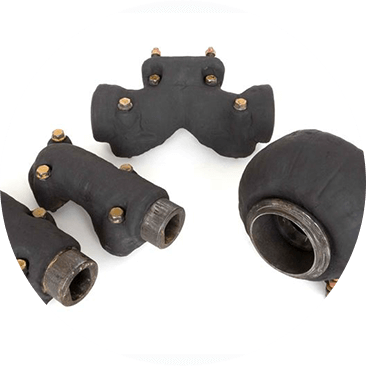 While removable insulation is ideal for components that frequently need to be inspected or worked on, permanent insulation is designed to provide durable, long-term insulation on parts that do not need to be accessed. Firwin’s Hard Coat insulation is sturdy while still being lightweight. It is most frequently used on components such as:
While removable insulation is ideal for components that frequently need to be inspected or worked on, permanent insulation is designed to provide durable, long-term insulation on parts that do not need to be accessed. Firwin’s Hard Coat insulation is sturdy while still being lightweight. It is most frequently used on components such as:
- Exhaust piping
- Turbochargers
- Elbows
- Exhaust manifolds
This permanent insulation differs from insulation blankets in that it cannot be removed. It is applied as a hard and permanent coating.
Firwin’s Hard Coat insulation has a number of benefits. Since it permanently encloses the component being insulated, it is entirely shielded from exterior elements. This means that fluid leakages such as equipment oil cannot seep into the insulation material, mitigating the risk of fires posed by certain insulation solutions.
Additionally, this permanent insulation is ideal for the small spaces often found in marine environments. While insulation blankets can sometimes be quite thick—which may not be feasible due to space constraint—Firwin’s Hard Coat insulation takes up less room, making it an ideal choice for components that don’t need to be accessed.

